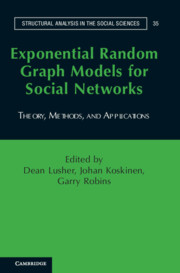Book contents
- Frontmatter
- Contents
- List of Figures
- List of Tables
- 1 Introduction
- Section I Rationale
- Section II Methods
- Section III Applications
- 14 Personal Attitudes, Perceived Attitudes, and Social Structures: A Social Selection Model
- 15 How To Close a Hole: Exploring Alternative Closure Mechanisms in Interorganizational Networks
- 16 Interdependencies between Working Relations: Multivariate ERGMs for Advice and Satisfaction
- 17 Brain, Brawn, or Optimism? Structure and Correlates of Emergent Military Leadership
- 18 Autologistic Actor Attribute Model Analysis of Unemployment: Dual Importance of Who You Know and Where You Live
- 19 Longitudinal Changes in Face-to-Face and Text Message–Mediated Friendship Networks
- Chapter 20 Differential Impact of Directors’ Social and Financial Capital on Corporate Interlock Formation
- 21 Comparing Networks: Structural Correspondence between Behavioral and Recall Networks
- Section IV Future
- References
- Index
- Name Index
14 - Personal Attitudes, Perceived Attitudes, and Social Structures: A Social Selection Model
Published online by Cambridge University Press: 05 April 2013
- Frontmatter
- Contents
- List of Figures
- List of Tables
- 1 Introduction
- Section I Rationale
- Section II Methods
- Section III Applications
- 14 Personal Attitudes, Perceived Attitudes, and Social Structures: A Social Selection Model
- 15 How To Close a Hole: Exploring Alternative Closure Mechanisms in Interorganizational Networks
- 16 Interdependencies between Working Relations: Multivariate ERGMs for Advice and Satisfaction
- 17 Brain, Brawn, or Optimism? Structure and Correlates of Emergent Military Leadership
- 18 Autologistic Actor Attribute Model Analysis of Unemployment: Dual Importance of Who You Know and Where You Live
- 19 Longitudinal Changes in Face-to-Face and Text Message–Mediated Friendship Networks
- Chapter 20 Differential Impact of Directors’ Social and Financial Capital on Corporate Interlock Formation
- 21 Comparing Networks: Structural Correspondence between Behavioral and Recall Networks
- Section IV Future
- References
- Index
- Name Index
Summary
Perceptions of Others and Social Behavior
An important insight of social network analysis is that social action may arise due to actor characteristics (Emirbayer & Goodwin, 1994; Kilduff & Krackhardt, 2008). The process of social selection specifies an interaction between social relations and actor-level attributes. Examples include gender homophily (McPherson et al., 2001), network closure and psychological predispositions (Kalish & Robins, 2006), and delinquency behaviors (Snijders & Baerveldt, 2003). Furthermore, interdependency between social relationships and identity was argued by White (1992) and implied by social identity theorists (Tajfel & Turner, 1979; Turner et al., 1987).
Apart from the personal characteristics of network actors, social action may also be motivated by the cues people take from others around them in the social setting. Previous work on perceptions and social networks focused on the perception of social ties (e.g., “cognitive social structures”; Krackhardt, 1987). Also, both social position in the network and individual personality differences were shown to be important for the accurate perception of the network (Casciaro, 1998). In this chapter, however, we discuss the effects of individual perceptions of the attributes of others in the network rather than the perception of ties. The attributes under consideration are perceived attitudes. To delineate terminology clearly, we note a fundamental difference between personally held attitudes (“personal attitudes”) and an individual's perception of the attitudes of others (“perceived attitudes”). In the study described in this chapter, perceived attitudes are based on individual perceptions of the attitudes “generally held” in the group.
- Type
- Chapter
- Information
- Exponential Random Graph Models for Social NetworksTheory, Methods, and Applications, pp. 189 - 201Publisher: Cambridge University PressPrint publication year: 2012
- 1
- Cited by



